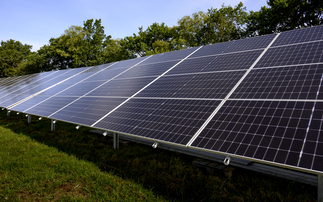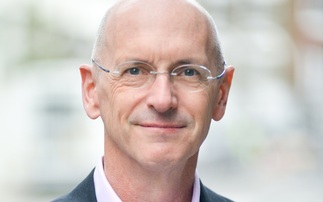Charities welcome Prime Minister's pledge of £5.8bn to help poor countries cope with climate change and cut emissions
The UK will spend £5.8bn on helping poor and vulnerable countries cope with the worst impacts of climate change over the next five years, Prime Minister David Cameron announced at the United Nations yesterday.
The pledge represents a doubling of climate assistance, with the funding split between helping countries reduce emissions and adapt to the consequences of warming temperatures, such as flooding, drought and rising sea levels.
The announcement has been broadly welcomed by green businesses and NGOs, as a sign that the UK is seeking an ambitious deal at the Paris climate talks in December. BusinessGreen runs down the reaction from key groups below.
Energy and Climate Change Secretary Amber Rudd:
"Climate change is one of the most serious threats we face, not just to the environment, but to our economic prosperity, poverty eradication and global security, hitting developing countries the hardest. To ensure a more secure and prosperous future for us all, the UK is playing its part by helping some of the most vulnerable communities become more resilient to climate change and by supporting the developing world to take the clean energy path to growth and prosperity rather than the high carbon route."
Green Party leader Natalie Bennett:
"The announcement indicates that this money is being taken out of the existing aid budget. It's not new money, so existing programmes dealing with health, poverty and other essentials will suffer.
"This move smacks of hypocrisy, and will add insult to injury for the people losing their jobs due to the cuts in support for the UK renewables industry. Helping other countries to increase their investment in solar power is to be welcomed, but by doing so while actively endorsing the use of fracked gas at home, the government is palming off responsibility for tackling climate change to those least responsible for causing it.
"It's time our prime minister faced up to the fact that we cannot fight climate change without slashing support for fossil fuels and investing in the renewable energy and home insulation that will cut our emissions and improve people's lives."
WWF UK chief executive David Nussbaum:
"Today's announcement to increase climate finance shows appetite for ambition - a welcome sign that the UK government will live up to the Prime Minister's pledge to strive for a strong deal at the UN climate conference in Paris. David Cameron has just joined other world leaders at the UN in a commitment to end poverty and achieve sustainable development. This announcement by the UK, combined with the similar announcement by Germany, sets an example for other developed countries ahead of Paris.
"Financing adaptation is crucial for poor and vulnerable communities around the world, which are having to cope with the early impacts of climate change - droughts, floods, food insecurity, often followed by unrest. We now look forward to further government commitments to boost the low carbon and renewables sectors here in the UK, ensuring that we can remain a leading voice in creating the low-carbon global economy."
UNICEF:
"We strongly welcome this announcement from the UK government, and its leadership in pledging to provide vital help to desperate communities whose lives are already being turned upside down by climate change. There is much that can and needs to be done to keep children in danger safe, now and in the future; from building homes and schools that can withstand extreme weather conditions to protecting water supplies from flooding.
"Acting now and helping communities build resilience in the face of climate change is a sensible and cost-effective course of action. Well prepared communities are less likely to have to start again each time a disaster hits, or to take the drastic decision to leave their homes and seek safety elsewhere. The deepening refugee and migration crisis in Europe has shocked the world and brought the plight of those forced to flee their homes and everything they know into stark focus. Without strong and determined global action to tackle climate change, rising sea levels, extreme weather and resource scarcity could lead to crises even more serious than this one becoming the norm."
Neil Thorns, advocacy director at CAFOD:
"We know it's the poorest countries who are feeling the effects of climate change most and as a richer nation, particularly one that helped contribute to climate change by burning fossil fuels, we have a responsibility to help them cope. Pope Francis is particularly strong on this point and has reminded the world of the different responsibilities countries hold to help those now suffering from climate impacts.
"We welcome the government's increase in climate finance, coupled with the commitments from China, the USA and Germany, this gives the international community the best possibility of agreeing an ambitious framework for action in Paris. Whether it's helping farmers in Ghana shift to drought-resistant crops, or helping coastal fishing communities in Malaysia prepare themselves for rising sea levels, climate finance is essential."
Christian Aid chief executive Loretta Minghella:
"The UK's pledge of greater climate finance will play a transformational role in giving people the climate stability they need to lift themselves out of poverty.
"The UK's substantial, multi-year commitment of funds will also help build trust with developing countries in the run up to the climate talks in Paris - trust that has been lacking in previous negotiations."
"Not only will this new pledge unlock international co-operation, it will also make a tangible difference to women, men and children in developing countries.
"This kind of finance is a win-win: it has the potential to bring clean, renewable energy to some of the poorest people in the world and also reduce global carbon emissions.
"We hope that other countries will follow suit over the coming weeks, ahead of the Paris Summit. At those talks, world leaders should also agree on global revenue-raising mechanisms to deliver the new, additional and predictable climate finance that we know will be necessary in the years to come."
This article is part of BusinessGreen's Road to Paris hub, hosted in association with PwC







